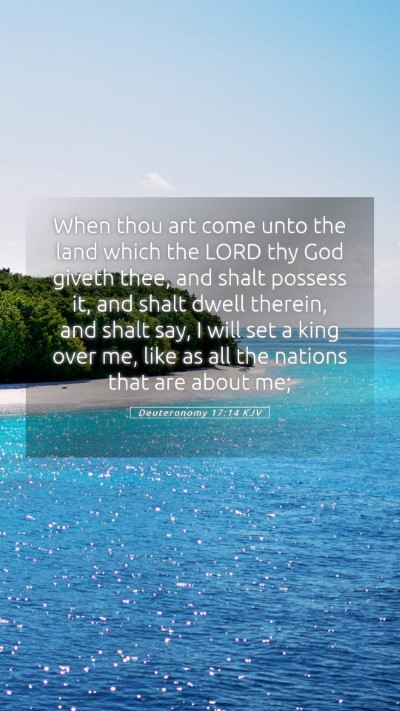Bible Verse Analysis: Deuteronomy 17:14
Deuteronomy 17:14 states: "When you come to the land which the Lord your God is giving you, and possess it and dwell in it, and say, 'I will set a king over me like all the nations that are around me,'" (NKJV). This verse introduces God's instructions regarding the establishment of monarchy in Israel.
Understanding Scripture
In this verse, God anticipates the Israelites' desire for a king, similar to the surrounding nations. It reveals the heart of the people, their longing for a human leader, and underscores their potential rejection of God's direct rule.
Bible Verse Meanings
This passage is significant as it outlines God's foreknowledge of Israel's future requests. The desire to have a king signifies a shift from dependence on divine leadership to human authority. This theme of leadership is further explored in various commentaries.
Commentary Insights
-
Matthew Henry:
Henry emphasizes that God's people ought to rely on divine guidance rather than seeking worldly validation through kingship. He suggests that the request for a king was indicative of a misunderstanding of God's providence and kingship.
-
Albert Barnes:
Barnes points out that the desire for a king was not inherently wrong, but the motivation behind it encompassed a lack of faith in God's ability to lead His people. He notes that God permits this request with specific regulations to ensure His guidance remains paramount.
-
Adam Clarke:
Clarke elaborates on the historical context, suggesting that Israel's yearning for a king stemmed from their interactions with other nations. He stresses that while God accommodates their request, it highlights an essential lesson on the consequences of preferring human rulers over divine sovereignty.
Biblical Exegesis
An analysis of Deuteronomy 17:14 reveals key themes such as leadership, obedience, and the importance of maintaining a relationship with God. The request for a king foreshadows the complexities and struggles Israel would face under human leadership, as seen in later scripture.
Application of Bible Verses
Understanding this verse aids believers in recognizing the need for Godly leadership in their lives. It prompts reflection on whether one is seeking human approval or divinely guided purpose. It also serves as a warning against compromising one’s faith for societal acceptance.
Bible Study Insights
For Bible study groups exploring this verse, the focus can be on the implications of leadership choices and the historical context of Israel's governance. This can lead to discussions about contemporary issues regarding authority and spirituality.
Related Bible Cross References
- 1 Samuel 8:5: The people's demand for a king.
- 1 Samuel 10:19: God’s permissive will in giving Israel a king.
- Proverbs 21:1: The Lord's control over human leaders.
Conclusion
Deuteronomy 17:14 provides insight into the human inclination towards kingship and leadership. Through the analysis of this verse and its commentaries, we gain a deeper understanding of Scriptural teachings on divine guidance versus human authority, and the lessons that remain relevant in modern faith practices.
This exploration helps answer questions about the significance and implications of desiring earthly leadership instead of seeking a closer relationship with God, emphasizing the importance of understanding not only the text but its application in our lives.


